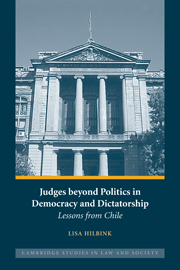Book contents
- Frontmatter
- Contents
- Acknowledgments
- Introduction
- 1 The Judiciary, the Rule of Law, and Democracy: Aspirations and Impediments
- 2 The Institutional Construction of the Judicial Role in Chile
- 3 Conservative Activism in the Heyday of Democracy, 1964–1973
- 4 Legitimizing Authoritarianism, 1973–1990
- 5 Continuity and Change after the Return to Democracy, 1990–2000
- 6 Conclusions and Implications
- Appendix A Orienting Information on Chilean Law and Courts
- Appendix B List of Interviewees (alphabetical by category)
- References
- Index
3 - Conservative Activism in the Heyday of Democracy, 1964–1973
Published online by Cambridge University Press: 08 January 2010
- Frontmatter
- Contents
- Acknowledgments
- Introduction
- 1 The Judiciary, the Rule of Law, and Democracy: Aspirations and Impediments
- 2 The Institutional Construction of the Judicial Role in Chile
- 3 Conservative Activism in the Heyday of Democracy, 1964–1973
- 4 Legitimizing Authoritarianism, 1973–1990
- 5 Continuity and Change after the Return to Democracy, 1990–2000
- 6 Conclusions and Implications
- Appendix A Orienting Information on Chilean Law and Courts
- Appendix B List of Interviewees (alphabetical by category)
- References
- Index
Summary
In the previous chapter, I sketched the historical construction of the judicial role in Chile around the ideal of “apoliticism.” I described the development of the institutional ideology that forbade judges to interfere in “political” questions, and I explained how the structural reforms of the 1920s, while enhancing judicial independence and professionalism, empowered the conservative judicial elite and, thereby, served to perpetuate nineteenth-century understandings of “law” and “politics” within the institution. In the decades that followed, Chilean judges hence displayed very conservative (that is, predemocratic and politically illiberal) professional attitudes and practices, even as the country as a whole underwent a process of significant democratization.
In this chapter, which covers the years 1964–1973, I defend that claim through an analysis of judicial behavior in civil and political rights cases, archival records, and interview material. My objectives are twofold. First, I seek to demonstrate that the substantive role of the judiciary in Chilean politics did not change radically with the advent of the Pinochet regime. Indeed, during the years leading up to the military coup, when Chile was considered one of the most democratic countries in the world, its courts played a role in the system that was quite illiberal and undemocratic. As in the past, judges generally deferred to the executive in the area of civil and political rights, leaving individual citizens at the mercy of the state.
- Type
- Chapter
- Information
- Judges beyond Politics in Democracy and DictatorshipLessons from Chile, pp. 73 - 101Publisher: Cambridge University PressPrint publication year: 2007



